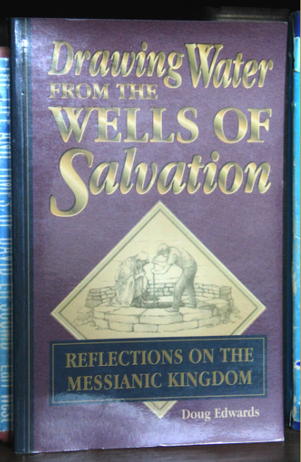Drawing Water From the Wells of Salvation |
Secondly, we fail to study the Old Testament because much of it is difficult and parts of it are boring. We love the narrative portions of the Old Testament (for the most part) because they are filled with excitement and action. Yet we view the presentation of genealogies and laws as boring, and find the books of prophecy too difficult to navigate. Because we find no immediate and easily discernible relevance for our life, we are not willing to do the work necessary to assimilate the material. If only we could come to understand how all of the laws and the prophecies were preparing for the arrival of the Messiah. Unfortunately, since we do not benefit from the Old Testament, there are large portions of the New that we also miss out on.
Thirdly, we often skip portions of the Old Testament because they disturb us, and we don't like being disturbed. God as presented in the Old Testament doesn't always harmonize with the God we construct in the New. Rather than grappling with His revealed character and nature, we simply ignore the God of the Old and focus exclusively on the God of the New. One day many will tragically meet the God of the Bible in an unprepared and shocked state at His glorious appearing. If we are to understand the mind of God, we must consider it from all of Scripture.
So, what does all of this have to do with Brother Doug Edward's book? Brother Doug's book introduces us to Messianic Prophecy, provides us with some basic tools for interpretation, and then begins to unlock the meaning of key passages. For many, Brother Doug's book will be a revelation.
Understanding Messianic prophecy is crucial to understanding the purpose of Israel and the nature and establishment of the Kingdom to which we belong. While teaching the fulfillment of prophecy and nature of the Kingdom, Brother Doug also combats the commonly held false doctrine of Premillennialism. By tackling several difficult passages, and providing hermeneutical tools for interpreting prophecy correctly, Brother Doug is able to teach prophecy positively and negatively at the same time. If merely used as a commentary on difficult passages of the Old Testament, readers would benefit greatly, though there is so much more to this book than that.
Here are some questions you should ask yourself to determine whether or not you need to read this book: Were God's promises in the Old Testament conditional or unconditional? Is prophecy typical in nature? What is "times coloring"? How are we to interpret poetic language? Do New Testament writers properly interpret and apply the Old Testament, or do they use passages out of context to make their own point? Can a passage be speaking of near and distant events at the same time? If so, how are we to understand the difference between what is near and that which is distant? Does the term "Kingdom" refer exclusively to the church, or is there a broader use of the term? What is the ultimate goal of prophecy?
If you can't answer all of the questions stated above, stop by our bookstore and pick up a copy of Drawing Water From The Wells of Salvation. You won't be disappointed.
Disclaimer: Brother Doug Edwards is a great Bible scholar and has tackled a difficult subject for the benefit of all. The nature of the subject has produced a book on a moderate to high moderate level of reading. This means there is no fluff, and readers are expected to go to work in order to benefit from the material. There are times when difficult things are discussed and explained, and there are other instances where difficult passages are introduced along with the tools needed to do the work, and the reader is expected to move forward on their own. My suggestion would be to read a chapter at a time and spend time reflecting on the material covered. I would also suggest getting a few friends to commit to reading through this book with you in order to establish some accountability and to have help answering questions that you may have as you read. If there are parts you don't understand, make a note, and reach out to a preacher or teacher who can help. Or, maybe reach out to Brother Doug himself.


 RSS Feed
RSS Feed
